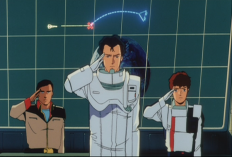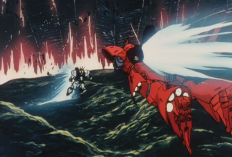

Yoshiyuki Tomino isn’t for everyone. The anime director and creator of the Gundam franchise is a bit of an odd duck. It’s hard to get a good snapshot of his personality, both in direction and in life. I’m guessing that a lot of this has to do with his long history in the business. After a while, a guy’s got to get tired of answering the same five or six questions about the same thing, no matter how much they’ve prospered from it. Then there’s his style of directing, wherein he refuses to hold the hand of the viewer. A plot may be pretty straight forward, but his approach to it in directing may leave some scratching their heads. Of course, it doesn’t help that the actual writing in Tomino programs varies wildly, but Tomino is definitely a pro at directing, expressing his favorite themes in a distinct style that impresses on the viewer their import while pulling them into the world of the story.
Let’s take the 1988 movie Mobile Suit Gundam: Char’s Counterattack as an example of something uniquely Tomino, for better and/or worse.
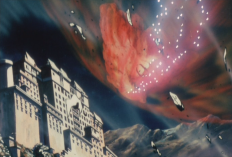
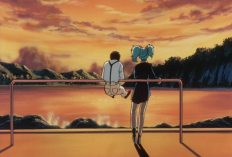
Char’s Counterattack is based on the novel Hi Streamer, written by Tomino, and serialized in anime magazine Animage. It takes place in the fictional Universal Century timeline, in the year 0093. Ace pilot Char Aznable has taken control of the Neo-Zeon faction, who were disenfranchised after Haman Karn’s death in Gundam Double Zeta. His goal is to force humanity off of Earth so that they can become Newtypes, evolved humans with hightened awareness. He plans to do this by dropping asteroids onto Earth, making it uninhabitable for humans. The Earth Federation’s Londo Bell unit, led by Bright Noa, is tasked with stopping him. Amuro Ray, the main protagonist in the original Mobile Suit Gundam television series and movies is a pilot with Londo Bell and hopes to defeat Char, who has once again become his rival.
The movie begins in medias res. The Neo Zeon have already sent an asteroid called Fifth Luna to destroy Lhasa, Tibet, capital of the Federation government. Too late to stop its descent, Amuro can only shake his fist at his opponent as he gloats over his victory, claiming that it’s his job to "enforce dicipline" on the polluters and corrupt politicians of Earth. It’s not established just how exactly Char gained control of Neo Zeon, how Amuro came to join Londo Bell, or how Fifth Luna was snatched and sent on its way. The viewer is thrown right into the mix with little established about the current situation.
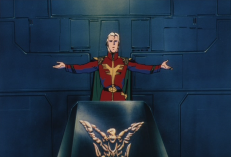
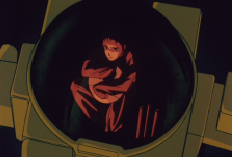
Some have found this approach very disorienting. Why is Char, who was working alongside Amuro in Zeta Gundam, now the villain? We don’t get any flashbacks to before this conflict erupted, and the only clues we recieve about the political climate are Char’s speech at Sweetwater about how the Titans and Haman Karn were corrupt forces looking to take advantage of vulnerable spacenoids (the people who live in space) and some chat here and there about Char being fed up with how the Earth government behaves. Whereas in Zeta Gundam, Char seemed content with waiting for people to evolve into Newtypes, here he’s taking preemptive action. What changed?
There are those who take this as character derailment, making Char a villain just for the sake of settling the rivalry between himself and Amuro in a grand fashion in this movie. It’s an opinion that cannot be ignored. There isn’t a whole lot to go on.
However, while Char Aznable holds fast to his core beliefs, he’s also the type always looking for a way to accomplish his goals. At some point in Zeta, when discussing humans enhanced with drugs ("Cyber Newtypes" according to the English dub and subtitles, but more like "enhanced humans"), Char wondered if mankind could just wait around for people to become Newtypes. Then there’s the events of Double Zeta, where Haman was using the Zeon name to commit horrible atrocities and the Federation were letting her. Kamille Bidan, who was his hope for the future, had been hurt and was slowly recovering. Char, based on his impatience and ego, isn’t likely to keep waiting around while all these things happened. So yeah, seeing him go to such extremes in this movie is a stretch, I won’t argue against that assessment, but he’s not acting so out of character for him.
What I appreciate is the approach of having the viewer pick up on the clues on their own, while not hiding anything vitally important to the narrative. It’s not such a complicated story, it’s just framed differently than past Gundam features. Also, it rewards the people who’ve been watching Gundam for a while with its nods to the previous entries in the Universal Century and their tropes. This is an approach that does not carry the viewer on its back or tell the story as if it were something that already happened. You’re experiencing everything as the characters are.
Moreover, the scale of combat lends itself to the grandness of the events. The Londo Bell unit deploys everything they have to try to stop the Neo Zeon from dropping the asteroid Axis and finishing off the Earth, and you feel the gravity of the situation and the determination of both sides. This, of course, means tons of battle casualties, including both movie-only and long running Gundam characters.
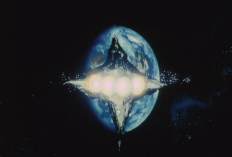
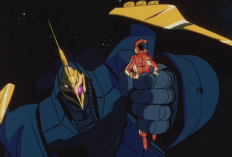
Production values were good for its time, boasting a wide variety of set pieces and mechanical designs. Character designs are a bit different than previous entries, this time very thin, almost vertically stretched, yet all the returning characters are easily identifiable. Laser and explosive effects still look beautiful. The animation is respectable. Even the clearly computer generated roatating colony looks decent, especially for the 80s. Perhaps most remarkable is Shigeaki Saegusa’s beautiful musical score that creates an atmosphere of intensity throughout the feature. Even people who dislike the movie find it difficult to object to the soundtrack.
Most important are Tomino’s themes of a spacebound humanity’s growing pains, mostly caused by those who refuse to move on. However, in this movie, it’s also the progressive Char who causes the main conflict, driven by the passion of the ignored and suffering spacenoids. Or rather, isn’t it his ego that drives him? Is his belief for humanity to move on or rather more that he is the one who leads them to that path? Char remains a master manipulator, bringing into question the honesty of his intentions. Is he doing the right thing for the wrong reasons? Or the wrong thing for the right reasons?
Can a man really change the fate of humanity? Should he? Char’s Counterattack pits longtime rivals in a battle for the future of the planet Earth and its people. It may be that Yoshiyuki Tomino moved forward with this movie to give a large budget end to Char’s ambitions, rather than relegate him to a last-minute big bad in Double Zeta (as it’s been rumored for years), but the movie does satisfy on several levels, regardless of intention. Maybe you will find the movie to be poorly constructed or be bothered by some of the movie-only characters (Quess and Hathaway tend to draw people’s ire), but as far as its construction and style, it suits its director, and Gundam, to a T.
